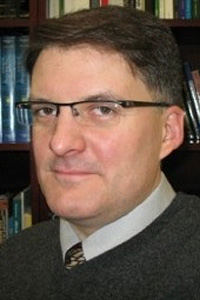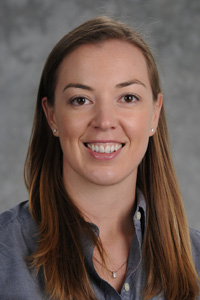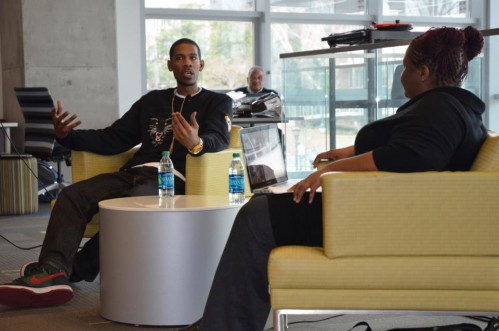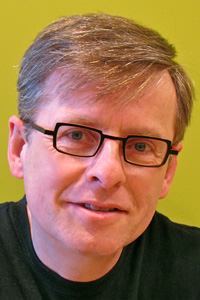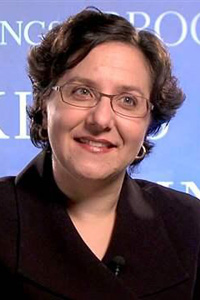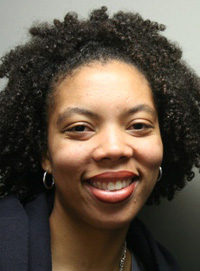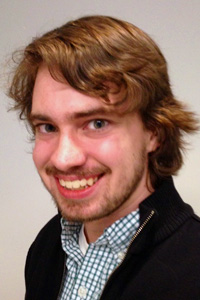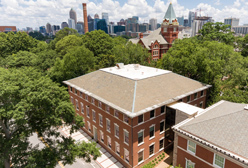New Sponsored Research
The National Science Foundation has awarded John Walsh, associate professor in the School of Public Policy, $213,109 for the development of an "Understanding Non-Research & Development Innovation."
Recent Books
Peddling Paradise: The Politics of Tourism in Latin America (Lynne Rienner Publishers, 2013), by Kirk Bowman, associate professor in The Sam Nunn School of International Affairs, draws on extensive fieldwork in eight countries between 1996 and 2011 to offer a rich comparative analysis and compelling explanations for both failed policies and impressive successes in using tourism to foster development in Latin America.
Refining Expertise: How Responsible Engineers Subvert Environmental Justice Challenges (New York University Press, 2013) by Gwen Ottinger, assistant professor, University of Washington-Bothell and LMC alumnus (STaC 1997), makes a case for how industrial facilities’ current approaches to dealing with concerned communities undermine individual grassroots campaigns, environmental justice activism, and efforts to democratize science.
What Does Georgia Tech Think?
Selected Press for Ivan Allen College of Liberal Arts
|
Nunn on the Global Nuclear Effort
"I consider moving to prevent the prevent the spread of nuclear weapons and to get nuclear materials under control as the most important security challenge not only America faces but also [facing] countries around the globe. The most important part of that is a near-national effort to squeeze North Korea and Iran and put maximum pressure short of military conflict if at all possible to get them to curb their nuclear appetite," said Sam Nunn, distinguished professor in The Sam Nunn School of International Affairs. Source: NPR's "All Things Considered, WABE 91.1 FM, March 14, 2012
April 1, 2013 - April 2, 2013
3:00 pm
|
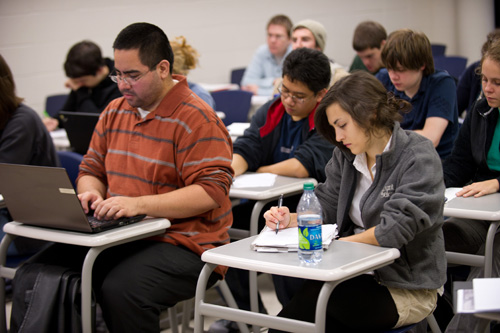
|
New Interdisciplinary STS Graduate Certificate Offers Tech Students a Cultural Perspective on Science
A newly approved certificate study program in the Ivan Allen College of Liberal Arts offers Georgia Tech graduate students a broader perspective on science and technology.
The Science, Technology, and Society (STS) Graduate Certificate is designed to enable graduate students from any college in the University to better understand the dynamic relationship between science and culture. Recipients of the certificate will be able to demonstrate a special competence in applying a holistic, cultural research lens to their home discipline research.
“Today, whether working as a project leader in industry or as a researcher in academia, the ability to communicate the social value of research is more important than ever,” said Anne Pollock, assistant professor in the School of Literature, Media, and Communication, and the certificate’s main coordinator. “The courses in the certificate are an excellent opportunity to hone critical thinking and written and oral communication, and to demonstrate that competence to future employers.”
The certificate was an idea formulated in faculty brainstorming sessions organized by Dean Jacqueline Royster in 2010, at the start of her tenure as dean. John Krige, professor in the School of History, Technology, and Society, convened an STS Graduate Seminar in the Fall of 2011 as a first step toward an official certificate.
“Science and engineering students who wish to be leaders in their careers simply cannot function successfully unless they are aware of the historical, sociological, economical, international, and political implications of what they do,” said Krige. “Wherever they lever their training they will be embedded in a social world.”
Nearly one dozen faculty members signed up to teach a session, a true reflection of the diversity and richness of both STS studies and IAC research.
Robert Rosenberger, assistant professor in the School of Public Policy, was a guest lecturer in the seminar and appreciated working with students from other disciplines.
"Now I'm on the dissertation committee of a student I met during that session," he said. "The different disciplinary backgrounds of the students–and me too, I'm a philosopher–lead to consistently strong discussions."
In the fall of 2012, the certificate received sponsorship of IAC schools. It was approved by the Institute’s Graduate Curriculum Committee in January, by the Academic Senate in February, and the University System of Georgia in March. While the certificate’s required courses have been taught over the past year as a trial run, the Registrar notified the Board of Regents in March that classes will be offered in Fall 2013, making the certificate official.
Carol Colatrella, associate dean of graduate studies in the Ivan Allen College, emphasized the necessity of students from any area of study to consider the “human dimensions” of the science, technology, engineering, and math research offered by the certificate.
“It is not enough to invent or to improve technologies and technical processes. One should recognize the interests that motivate designers and consumers,” she said.
For IAC, the social complexities posed by these interests are challenges the college is ready to prepare its students to tackle.
Related Links:
|
1973 Alumnus Establishes First Professorship in Economics
|
|
This article was originally published by the Georgia Tech Campaign Quarterly. It is reproduced here in full. Richard B. “Rick” Inman Jr., ECON 1973, has a lofty ambition: to raise the profile of the School of Economics to the national level. In support of that goal, Inman has made a six-figure commitment establishing the School’s first-ever endowed faculty position: the Mary S. and Richard B. Inman Jr. Professorship. The professorship will allow the School—a unit of the Ivan Allen College of Liberal Arts—to attract and retain an eminent teacher-scholar and thought leader in the discipline of economics. “What led me to make this commitment,” Inman explained, “was a conversation with Dean [Jacqueline] Royster about the evolution of the Ivan Allen College of Liberal Arts and how I could help the School of Economics attract new talent. I also realized the importance of my economics education to my career. I was particularly impressed by the objective of the School’s new chair, David Laband, to improve the School’s status on a national level. I wanted to use the professorship as a way of running a flag up the pole to say, ‘this is a good School and here’s someone who is willing to stand behind it and make a commitment to attract exceptional faculty.’” Inman is co-founder and managing principal of Atlanta-based Iron Bridge Capital Partners, a private equity and development company that provides investment capital and development expertise for commercial real estate, infrastructure, power generation, and government and educational facilities. Since its founding more than ten years ago, the firm has invested more than $250 million and grown well beyond its southeastern roots, acquiring a power plant in Guam and building schools and low-income housing on the South Pacific island. The former president of Tucker Federal Bank (acquired by Royal Bank of Canada in 2001), Inman says his Tech education provided a great framework for analyzing a variety of social and business issues. “The technological orientation of the economics curriculum provides a real competitive edge,” he said. “My education was very quantitative. I went to business school later and breezed through the quantitative courses in comparison to students who had gone through more sociologically focused economics programs.” This approach to economics is more compelling today than ever before, says School of Economics Chair David N. Laband, who came to Georgia Tech last year from Auburn University. “Economics is the science of decision making, but good decision making is critical in every aspect of life, not just the business world,” he explained. “Consequently, applications of economics touch us deeply and pervasively. With this more encompassing focus of economics in a liberal arts college, economics as a scientific discipline truly flourishes and contributes vibrantly to our understanding of the full range of human behavior.” Laband also expressed deep gratitude to Inman for his philanthropy. “The Inman Professorship is a real milestone for the School of Economics as it is our first and only named professorship,” Laband said. “This professorship is of vital importance to the School because it will help us attract and retain an accomplished scholar to provide long-term leadership with respect to developing our fledgling doctoral program. This is a critical part of our effort to create a nationally prominent economics program at Georgia Tech. We hope that other friends and alumni of Georgia Tech who would like to see us develop a nationally prominent economics program will follow the Inmans’ lead.” To inquire about making a gift in support of the Ivan Allen College of Liberal Arts or any of its six schools, contact Director of Development Juan A. McGruder at 404.894.1898 or juan.mcgruder@iac.gatech.edu. |
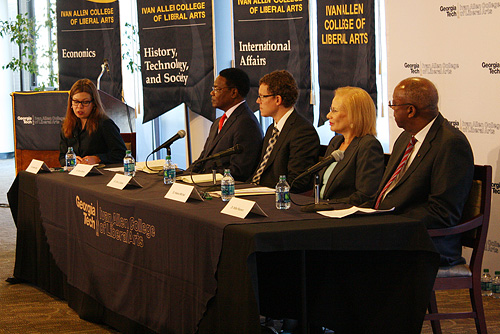
|
Founder’s Day Panels Highlight the Risks and Lessons of Moving "From Witness to Action"
The faculty panel at Founder’s Day gathered in front of the bright lights of C-SPAN cameras. They represented various schools across Ivan Allen College, whose research and life experiences revolved around issues of social justice. They all work with real people and real lives. Moderator Jennifer Clark, associate professor in the School of Public Policy, challenged faculty panelists with a pointed questions: “What do you do when you’re wrong?” Here is what they said.
Danny Boston, professor in the School of Economics
“There are two kinds of people who never do anything wrong. One is a dictator, the other never does anything at all.”
Boston noted that, “There are degrees of being wrong." He recalled an incident when his first book was published and he proudly showed it to his mother, who promptly took it into her bedroom to read. When she came out a few hours later, Boston asked her what she thought about the book which had a dedication to her on its front piece.
“Well, son,” she said, “About the only thing I understood was the first page.”
Boston related that, in that moment, he realized the importance of making his work approachable.
Christopher Le Dantec, assistant professor in the School of Literature, Media, and Communication
“Being wrong is a tool,” said Le Dantec. “It requires skill to understand that I, as an expert, would be wrong,” especially when working with communities outside academia. Le Dantec has conducted research with homeless shelters, and said “There is no better expert in homelessness than a homeless person.”
Le Dantec said integration of technology into disenfranchised communities means not coming in with solutions, but understanding and addressing problems the community perceives as relevant.
Helena Mitchell, executive director of the Center for Advanced Communications Policy
“Fear can be paralyzing, and once you give into that fear you’re not going to get anywhere,” said Mitchell. She said you can’t let yourself be paralyzed. “You must take an active part in what you see going on around you if you want to impact change.”
Mitchell discussed her efforts as a young protester in the Civil Rights movement and Vietnam War era. “Change far outpaces how things are done in academia,” she said. She advocated an increased focus on junior faculty and students for cultivation of ideas and innovation in the face of change.
Willie Pearson, professor in the School of History, Technology, and Society
“In the real world, when you’re dealing with people being injured and getting killed, you don’t have time for longitudinal studies,” said Pearson. “Arrogance can take you down.”
Pearson spent time in North Carolina, researching the rise of gangs. He had to confront biases in mental evaluations where underprivileged youth were more likely to have diagnoses of "extreme violent tendencies," in contrast to the more generic diagnosis of "behavior problems" assigned to teens from higher-income families.
“I never had the perspective of blindly accepting methods. I knew if you had the tools, you could question them,” said Pearson.
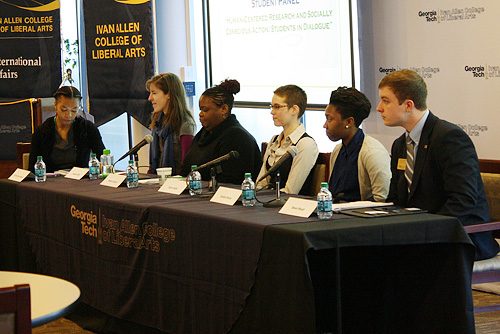
Student Panel
A student panel preceding the faculty panel addressed efforts by students to integrate their learning with real-world applications. The panel was moderated bySheri Davis-Faulkner, community liaison for the Westside Communities Alliance, and included:
- Nettrice Gaskins, Digital Media doctoral candidate
- Susan Ingber, Public Policy masters candidate
- Rebecca Rolfe, Digital Media masters candidate
- Danielle Sharpe, History, Technology and Society major
- Steven Waugh, International Affairs major
Jacqueline Royster, dean of the Ivan Allen College, noted that both the faculty and student panels emphasized that “research and action are not mutually exclusive.”
“The reality of Ivan Allen College is that we are deliberately bringing research and action together, just as we’re bringing arts and sciences together,” Royster said.
This year’s theme, “From Witness to Action,” commemorated the 50th anniversary of Mayor Ivan Allen Jr.’s Congressional testimony in support of what would become the Civil Rights Act fo 1964. His testimony resulted in he and his family requiring police protection for a year due to threats against their lives for their support of civil rights for black Americans.
|
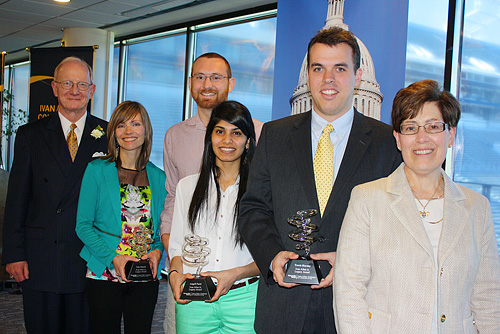
|
2013 Ivan Allen Jr. Legacy Awards Presented
Alumnus Travis Horsley, faculty member Dr. Lisa Yaszek,and students Angeli Patel and Andrew Quitmeyer were presented Ivan Allen Jr. Legacy Awards during the Ivan Allen College of Liberal Arts Founder's Day celebratation on March 13.
The awards honor faculty, students, and alumni as innovators who are shattering traditional boundaries to create solutions that are deliberately interdisciplinary, socially responsible, and ethically conscious, and who are courageously advancing the cause of social justice. Their character and work embody the values and principlesof the college's founding namesake, former Atlanta Mayor Ivan Allen, Jr.
Lisa Yaszek, professor in the School of Literature, Media, and Communication, was recognized for extraordinary work in science fiction's sociological applications and for her dedication as a teacher.
Travis Horsley, MSc in Public Policy (2012) and BS in International Affairs and Modern Languages (2010), was recognized for co-founding Tubing Operations for Humanitarian Logistics (TOHL), an enterprise that uses plastic tubing dropped by a helicopter to revolutionize the way isolated communities receive water and the way water is delivered in emergency situations.
Andrew Quitmeyer, PhD candidate in Digital Media in the School of Literature, Media, and Communication, was recognized for his research connecting the quantitative realms of computer science and biology with the creative area of digital performance in projects that have taken him around the world.
Angeli Patel, International Affairs major, was recognized for her foundation and leadership of ReThink, focusing on disabilities education, and her active participation in campus activities.
The Ivan Allen Jr. Legacy Awards are made possible through the generosity of Colonel Stephen C. Hall and Mrs. Pamela Hall.
|

|
IAC Faculty Receive Teaching Awards
A number of IAC faculty are 2013 recipients of teaching awards offered through the Center for the Enhancement of Teaching and Learning. They will receive their awards at a luncheon for faculty and staff honorees in April.
|
Colatrella's GEMS Club Receives Educational Partnership Award
|
|
Carol Colatrella, associate dean for graduate studies at the Ivan Allen College and professor in the School of Literature, Media, and Communication, is part of a team that has received the 2013 Educational Partnership Award offered through the Georgia Tech Center for the Enhancement of Teaching and Learning (CETL). Colatrella codirects Girls Excelling in Math and Science (GEMS) Club with Mary Lynn Realff, associate professor in the School of Materials Sciences and Engineering. The Club is a joint initiative sponsored by the Center for the Study of Women, Science, and Technology (WST) and Inman Middle School. Members of the educational partnership include: - Mehran D'Souza (ISYE), student
- Natalie Payne (BME), student
- Mercedes Shannon (MGT), student
- Lu Ling (BME,) student
- Andrea Del Risco (ISYE), student
- Paula Herrema, Inman Middle School Principal
- Candice Price, 7th grade science teacher
Now in its fifth year of operation, GEMS attracts more than 40 girls in grades six through eight to its sessions. Club members meet after school for one and a half hours each week to engage in hands-on experiments and leadership activities. The Educational Partnership Award is an annual Georgia Tech award of $7,500 that recognizes genuine and substantial partnerships between the faculty and students of Georgia Tech and the K-12 community. GEMS Club will accept the award at the annual staff and faculty awards luncheon in April. |
Dhongde and Head Receive Junior Faculty Awards
Shatakshee Dhongde (top right), assistant professor in the School of Economics, and Karen Head, assistant professor in the School of Literature, Media, and Communication, have been named 2013 CETL/BP Junior Faculty Teaching Excellence Award recipients.
"When I am in a classroom, I do not stand in front of the students to teach them—perhaps I am too young, too inexperienced and too unorthodox to do that—I strongly believe that I am in the classroom to facilitate learning among students," Dhongde wrote in her reflective statement. "Every semester, we embark on this journey together—we learn the material together. The students learn it for the first time, I learn it the second, the third, the nth time…but the joy of discovery never fades."
 The award is co-sponsored by the Georgia Tech Center for the Enhancement of Teaching and Learning (CETL) and BP America. Annually up to six $3,000 awards are given in recognition of teaching excellence and educational innovation on the part of Junior Faculty. The award is co-sponsored by the Georgia Tech Center for the Enhancement of Teaching and Learning (CETL) and BP America. Annually up to six $3,000 awards are given in recognition of teaching excellence and educational innovation on the part of Junior Faculty.
|
Kirkman Honored with Eichholz Teaching Award
|
|
Robert Kirkman, associate professor in the School of Public Policy, has been named a recipient of a 2013 Geoffrey Eichholz Teaching Award for his innovative work in converting his ethics classes to problem-based learning. Kirkman's decision to reformat his classes "shows a deep concern on his part with effective teaching and learning, tailored not only to the material, but also to the student’s needs. His reflexive awareness of his classroom and his determination mid-career to invest considerable time in retooling himself to provide his students with a superior course ... should be commended," wrote Diana Hicks, chair of the School of Public Policy, in her letter of nomination. Kirkman's work in redesigning his ethics classes is part of a broader initiative of the Center for Ethics and Technology. The initiative is working to establish Georgia Tech as a center of innovation in ethics education. "Ethics education is and should be an essential part of preparing students for work as professionals in any field," says Kirkman of his teaching perspective. "Engineers, for example, may think of themselves as focused primarily on finding technical solutions to technical problems, but they are always doing so in a social context, working with and for other people. This means that they will always, at the same time, be called upon to recognize and resolve human problems, ethical problems." Established in 2005 through a gift from School of Mechanical Engineering Regents’ Professor Emeritus Geoffrey Eichholz, this annual award recognizes faculty who provide outstanding teaching to students in core and general education undergraduate courses. Recipients receive $5,000 per year for three years. |
Raczynski Receives Outstanding Advisor Award
Katie Raczynski has received the Georgia Tech Outstanding Undergraduate Academic Advisor Award.
Raczynksi served for three years as an academic advisor to students in the Computational Media program, a collaborative effort by the IAC School of Literature, Media, and Communication and the College of Computing, before becoming director of Undergraduate Advising for Computing in February.
The award is sponsored by the Undergraduate Studies Office and recognizes faculty or staff whose primary role is advising and who render outstanding performance in undergraduate academic advising. Recipients receive a $2,000 award at the annual faculty/staff awards luncheon in April.
|
Faculty on the Media Circuit
IAC faculty were invited guests to a number of news shows in recent weeks. Here's what they had to say.
|
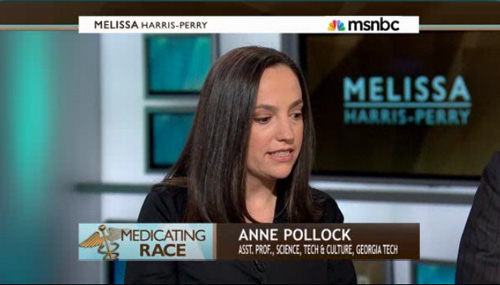
|
Pollock on Melissa Harris-Perry Show
"Early on, heart disease researchers were really focused on elite white men, on the stressful lives that they were living, and that were sedentary. Obviously that was not all Americans in the 1920s and 30s. There were a lot of people who were left out of that story," said Anne Pollock, assistant professor in the School of Literature, Media, and Communication. "With the progress and democracy that has happened through social justice movements, those notions about heart disease risk have also expanded."
Watch the interview.
|
The Science of Music: Interview with a Hip-Hop Legend
|
|
|
|
Grammy winning, hip-hop engineer Young Guru, who engineered ten of Jay-Z’s eleven albums, returned to Georgia Tech on March 5, 2013, to discuss the history of hip-hop, the art of audio engineering, and its cultural implications. Nettrice Gaskins, a Digital Media doctoral candidate in the School of Literature, Media, and Communication, led an interview with Young Guru and moderated questions before his campus lecture. “I wanted to learn more about how Young Guru sees the future as a vehicle for creating new and innovative engineering techniques,” Gaskins said. “Music, art, and literature are expressions of agency that empower people who are often missing in mainstream science fiction to envision a different future for themselves.” In response to Gaskins’s questions, Young Guru explained how technical skills are gained through casual use of technologies and through networks of informal apprenticeships, where peers demonstrate to each other their techniques. In this intimate setting, Young Guru described the types of social interactions that take place based on sound energy and vibration. During the interview, Gaskins played "Run This Town" by Jay-Z featuring Kanye West and Rihanna and "Renegade" by Jay-Z featuring Eminem. Young Guru deconstructed the first verse of each song line-by-line to demonstrate the importance of understanding the language when listening to hip-hop music. “Hip-hop production is at the intersection of creativity, innovation, and culture,” Gaskins explained. “I think that if we study the aspects of hip-hop production we will find keys to engage groups that have low participation in science, technology, engineering, and mathematics (STEM) fields.” The interview aired on radio station WREK 91.1 in March. In addition to giving a lecture on hip-hop history and culture, Young Guru has been involved in Georgia Tech’s program EarSketch, a project co-run by Jason Freeman, associate professor in the School of Music, and Brian Magerko, assistant professor in the School of Literature, Media, and Communication. This project engages students in computing principles through collaborative computational music composition and remixing. Young Guru has contributed thousands of loops and beats for the project. |
Utz on the Entrepreneurial Spirit of English Professors
Richard Utz, chair of the School of Literature, Media, and Communication, wrote a guest column for Inside Higher Education on March 4, 2013. This is an excerpt from the piece, printed in full here.
In 1892, the president of Leland Stanford University, David Starr Jordan, managed to convince Ewald Flügel, a scholar at the University of Leipzig, to join the young institution’s rudimentary English department. Flügel had received his doctoral degree in 1885 with a study of Thomas Carlyle under the aegis of Richard Wülcker, one of the founders of English studies in Europe. Three years later, he finished his postdoctoral degree, with a study on Sir Philip Sydney, and was appointed to the position of a Privatdozent at Leipzig.
The position of the Privatdozent is one of the most fascinating features at the modern German universities in the late 19th century. Although endowed with the right to direct dissertations and teach graduate seminars, the position most often offered only the smallest of base salaries, leaving the scholar to earn the rest of his keep by students who paid him directly for enrolling in his seminars and lectures. In a 1903 Stanford commencement speech Flügel warmly recommended that his new colleagues in American higher education embrace the Privatdozent concept:
"What would the faculty of Stanford University say to a young scholar of decided ability, who, one or two years after his doctorate (taken with distinction), having given proof of high scholarly work and spirit, should ask the privilege of using a certain lecture room at a certain hour for a certain course of lectures? What would Stanford University say, if – after another year or two this young man, unprotected but regarded with a certain degree of kindly benevolence […], this lecturer should attract more and more students (not credit hunters), if he should become an influence at the university? What if the university should become in the course of years a perfect hive of such bees? […] It would modify our departmental boss-system, our worship of "credits," and other traits of the secondary schools; it would stimulate scholarly life at the university; it would foster a healthy competition in scholarly work, promote survival of the fittest, and keep older men from rusting."
Read the full piece here.
|
Wittes on the Future of US Involvement in the Middle East
Tamara Wittes, Director of the Brookings Institution`s Saban Center for Middle East Policy, gave a campus talk on February 28, 2013. The event was organized by The Sam Nunn School of International Affairs’ Center for International Strategy, Technology, and Policy (CISTP) and the General Ray Davis Memorial Fund.
Wittes was Deputy Assistant Secretary of State for Near Eastern Affairs (2009-2012) and Deputy Special Coordinator for Middle East Transitions (2009-2012) during the Arab Spring. For years, the U.S. has had a Middle East strategy based on ensuring the flow of oil and preventing war between Arab countries and Israel. Wittes proposed moving beyond this old strategy and creating a coalition of cooperative ties to support the transition to democracy in the Middle East. Although there is considerable pressure for the U.S. and President Obama to close the door on the Middle East, she said there are many reasons to keep the door open.
Wittes discussed the reality that one-third of Egyptians are under thirty and many of them are unemployed. If they are unemployed, they are unable to move out of their parent`s house, they are unable to get married, they cannot even date, and are at great risk for drug addiction. At the same time, Egyptians are exposed to new media, including social media like Facebook and satellite TV. New ideas are coming into the region.
After her talk, Wittes met with students considering careers at the Department of State.
Related Links
|
Davis-Faulkner Moderates Economic Development Forum
|
|
Sheri Davis-Faulkner, community liaison at the Ivan Allen College of Liberal Arts, moderated a talk by Wesley Brooks at the Innovations in Economic Development forum on March 6, 2013. Brooks is Director of Special Projects at The Center for Working Families as well as the Green and Healthy Homes Initiative Coordinator for the City of Atlanta. "The Center for Working Families Inc. is a unique gem on the Westside that advances economic development through critical social support for resident needs in the Pittsburgh and Mechanicsville communities. This event highlighted a successful model of community development through the Green and Healthy Housing Initiative which attends to intersecting concerns regarding health, environment, and employment," said Davis-Faulkner. Brooks shared practices from a series of programs and projects that involve workforce training and sustainable development. He discussed how local residents have been trained in remediation of lead-based paint, asbestos, and other residential safety hazards and how this training has resulted in new skills, green jobs, and housing rehabilitation. The Innovations in Economic Development forum brings together faculty, researchers, students, economic developers, and policymakers to discuss leading-edge ideas and practices in economic development and innovation policy. The events are sponsored by the Program in Science, Technology, and Innovation Policy (STIP), a joint initiative of Georgia Tech's Enterprise Innovation Institute and the School of Public Policy. |
Collier Wins 2013 IAC Undergraduate Research Award
|
|
Stuart Collier, a Science, Technology, and Culture (STAC) major in the School of Literature, Media, and Communication, is this year's recipient of the IAC Undergraduate Research Award. Collier won the award for his paper on "Cinephilia and Online Communities," written while working with advisor Vinicius Navarro. The paper focuses on how the Internet has democratized cinephilia by transferring power from distribution companies and journalistic publications to amateur film enthusiasts. The amateur enthusiasts are in turn forming new global film communities, employing file sharing to promote marginalized films, and making important contributions to film discourse and criticism. "Cinephilia refers to the passionate love of cinema, and it is a phenomenon that overlaps with many important issues in film studies: film theory, film distribution, canon formation, etcetera," said Collier, explaining his research work with Navarro. "As a passionate cinephile who is highly active in online film communities, I was able to draw on my personal experience with online film culture, using key ideas from new media studies to situate my findings." Navarro will present the award to Collier at the undergraduate research symposium on April 11, 2013. |
Metz Receives Honorable Mention at SEUSS
|
|
Katherine Metz, a student in the School of History, Technology, and Society (HTS), received an Honorable Mention for her paper, "Coffee Prices and Consumption in the United States and Finland" at the 2013 Southeastern Undergraduate Sociology Symposium (SEUSS). Metz wrote the paper as the result of an HTS seminar. The paper topic was inspired by a trip to the grocery store. She noticed coffee prices had increased and decided to investigate. "After researching, I learned that the prices have been unstable for the last 20 to 25 years and began to grow after the 2008 food crisis and the 2008 financial crisis," said Metz. "The price issues have led to a movement called traceability that could arguably change the coffee system, if it is applied the way it is planned. It was interesting to look at and uncover how globalized economies have become." SEUSS was held February 22-23, 2013, on the campus of Morehouse College. |
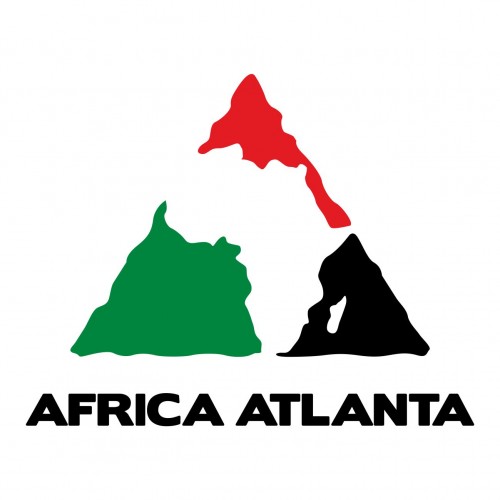
|
IAC Previews City Wide Events for Africa Atlanta 2014 on April 2
All are invited to attend the preview of a new city wide year-long celebration, Africa Atlanta 2014, during events at 7:00pm April 2 at the Academy of Medicine.
Dean Jacqueline Jones Royster will introduce the context and concepts of Africa Atlanta 2014 with co-organizers, the Consul General of Belgium in Atlanta, and Africa Atlanta Partners from across the city. The preview program will take place during opening night of the African Film Series.
Modeled on the highly successful France-Atlanta, Africa Atlanta 2014 will reinvent the cultural and economic bonds between Africa, European, and American cultures in Atlanta through an extraordinary array of art exhibitions, performances, cinema, symposia, conferences, and workshops. An Africa Atlanta website will launch April 3. Contact deshawn.jenkins@iac.gatech.edu for more information.
|
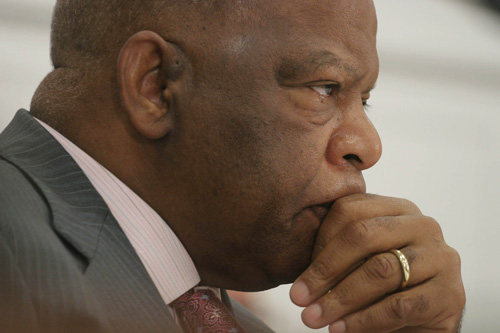
|
John Lewis to Give Social Courage Prize Address
All are welcome to attend events honoring Congressman John Lewis, an icon of American civil rights and this year's recipient of the Ivan Allen Jr. Prize for Social Courage, to be held April 4 at The Biltmore.
“John Lewis put his life on the line for many years during the 1960s to bring about equality under the law for all Americans. His unflinching civil rights leadership and ongoing advocacy for social change throughout his career have elevated the causes of human rights around the world,” said Georgia Institute of Technology President G.P. “Bud” Peterson. “It is our privilege to honor the life and work of Congressman Lewis through the Ivan Allen Jr. Prize for Social Courage.”
Students, faculty, staff, alumni, and guests are encouraged to attend the follow events open to the public:
Allen Prize Symposium, 9am - Noon
"Building Communities of Trust:" Recognizing the Life and Works of the Honorable John Lewis
Award Ceremony, 1:15pm - 2pm
Presentation of the Ivan Allen Jr. Prize for Social Courage and Recipient Address
Click here to RSVP.
Related Links
|
Upcoming Shadow Day Will Prospective Students Will Get an Inside Look at Life in IAC
Ivan Allen College of Liberal Arts Shadow Day is April 4. The event was created by the college's Student Advisory Board as a way of helping students test their fit as a liberal arts student at Georgia Tech.
While there are other visitation programs offered at Georgia Tech, the Shadow Day event is unique. Throughout the day, prospective students will be guided by Ivan Allen College students so that they can experience life as a Georgia Tech liberal arts major. The goal is to assist students make their decision on where to go to college. The entire day, students are surrounded by Liberal Arts students, faculty, and staff who answer questions and make visits productive and worthwhile. This event has been such a success that the college has made Shadow Day an annual event. Space is still available so visit Shadow Day to register.
|
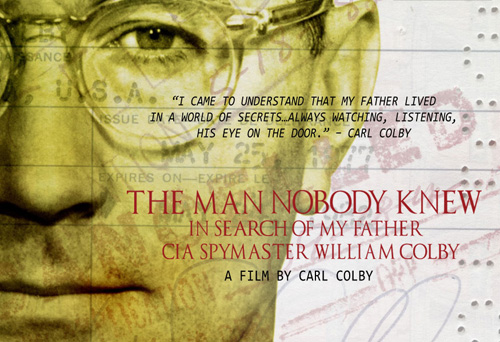
|
Son of Spymaster William Colby to Visit for Film Screening of “The Man Nobody Knew”
Filmmaker Carl Colby will be present to introduce his film, "The Man Nobody Knew: In Search of My Father CIA Spymaster William Colby," in a screening sponsored by the School of History, Technology and Society, the Honors Program, and the Center for Teaching and Learning.
The documentary is a son's riveting look at a father whose life seemed straight out of a spy thriller. The story is at once a probing history of the CIA, a personal memoir of a family living in clandestine shadows, and an inquiry into the hard costs of a nation's most cloaked actions.
The event, to be held April 2 in LeCraw Auditorium of the Ernest Scheller Jr. College of Business, is free and open to the public; reservations are not required.
For more event information, click here.
|
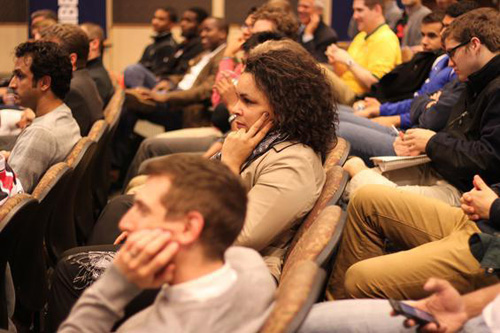
|
Soccer in Brazil More Than a Game, Atlantans Learn
Global Atlanta teamed up with The Sam Nunn School of International Affairs to host two sessions titled: “Understanding the World Through Soccer.” Here's an excerpt from the news story published on March 20.
In 1994, when Brazil won its fourth World Cup during a tournament held in the United States, the Atlanta Brazilian community came together - faces painted and flags waiving - for an impromptu parade down Peachtree Street.
The Atlanta police didn't know how to respond, said Lucia Jennings, a pillar in the local Brazilian community who helped found the Brazilian-American Chamber of Commerce here.
"Next thing I know I have 20 police cars stopping, I had about five guys arrested," she told the audience. "I had to go and speak to the TV that evening, and the next day I had to go to the police station and tell the judge that we were not rioting."
The fanaticism illustrates how identity in Brazil and across Latin America is tied to soccer, said Kirk Bowman, an associate professor of international affairs at Georgia Tech who teaches a popular course on soccer and global politics.
"Becoming a citizen of that team is so important that there are all sorts of stories of families that when a child is born, the first thing you do is get their membership club card; the second thing you do is have their baptism," Dr. Bowman said in his presentation.
Read the full story.
|
|










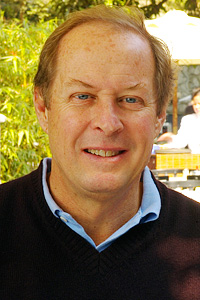




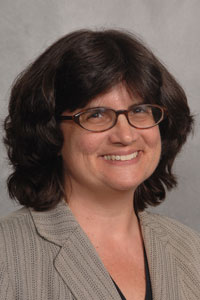
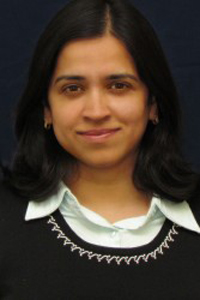
 The award is co-sponsored by the Georgia Tech Center for the Enhancement of Teaching and Learning (CETL) and BP America. Annually up to six $3,000 awards are given in recognition of teaching excellence and educational innovation on the part of Junior Faculty.
The award is co-sponsored by the Georgia Tech Center for the Enhancement of Teaching and Learning (CETL) and BP America. Annually up to six $3,000 awards are given in recognition of teaching excellence and educational innovation on the part of Junior Faculty.